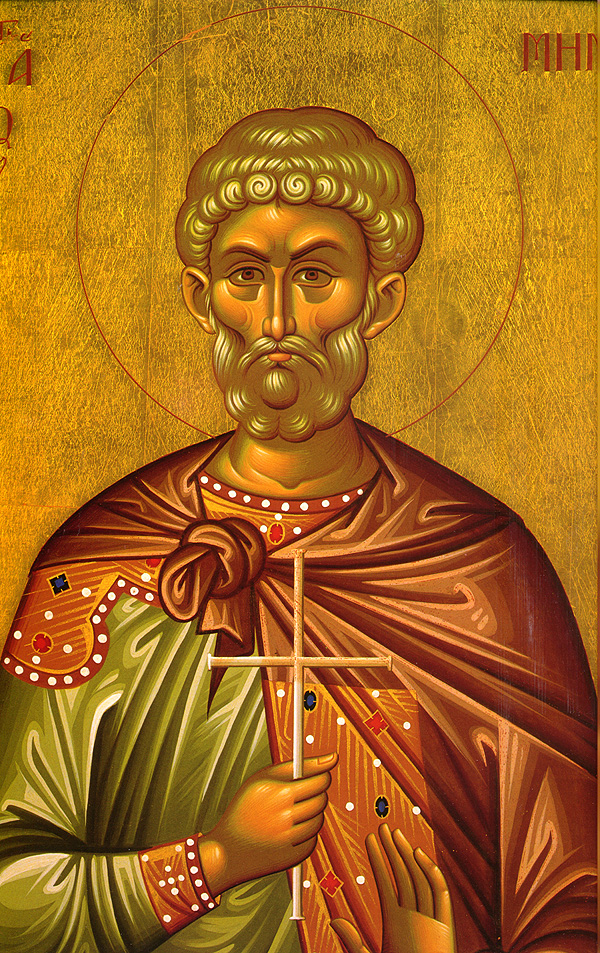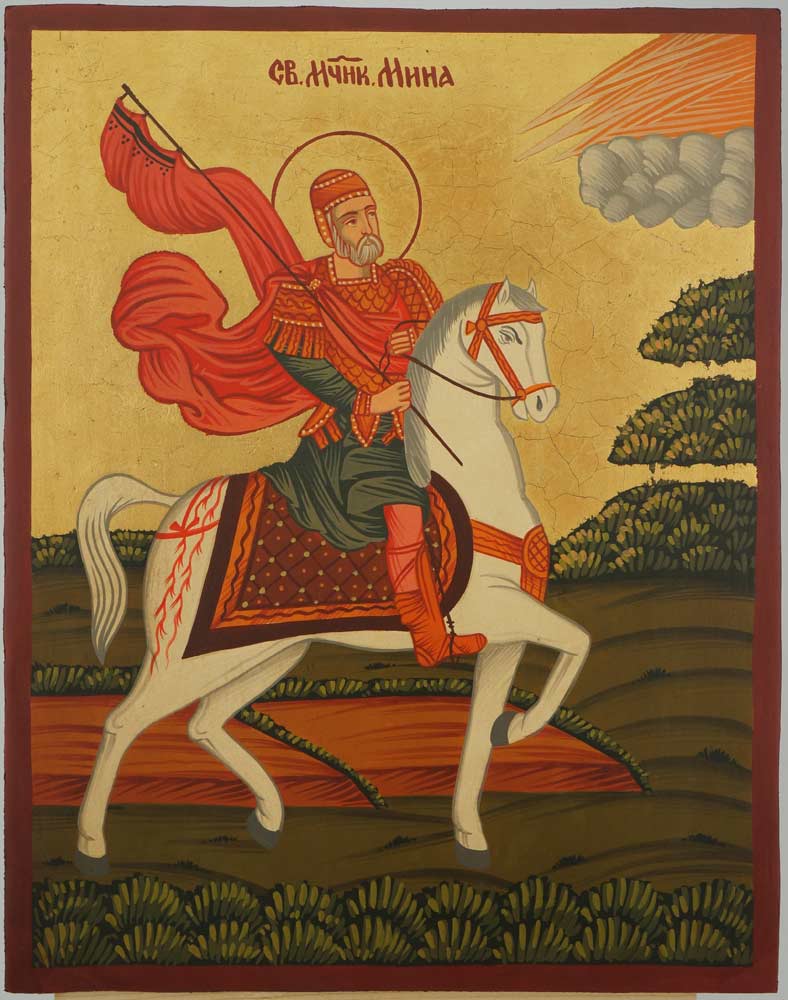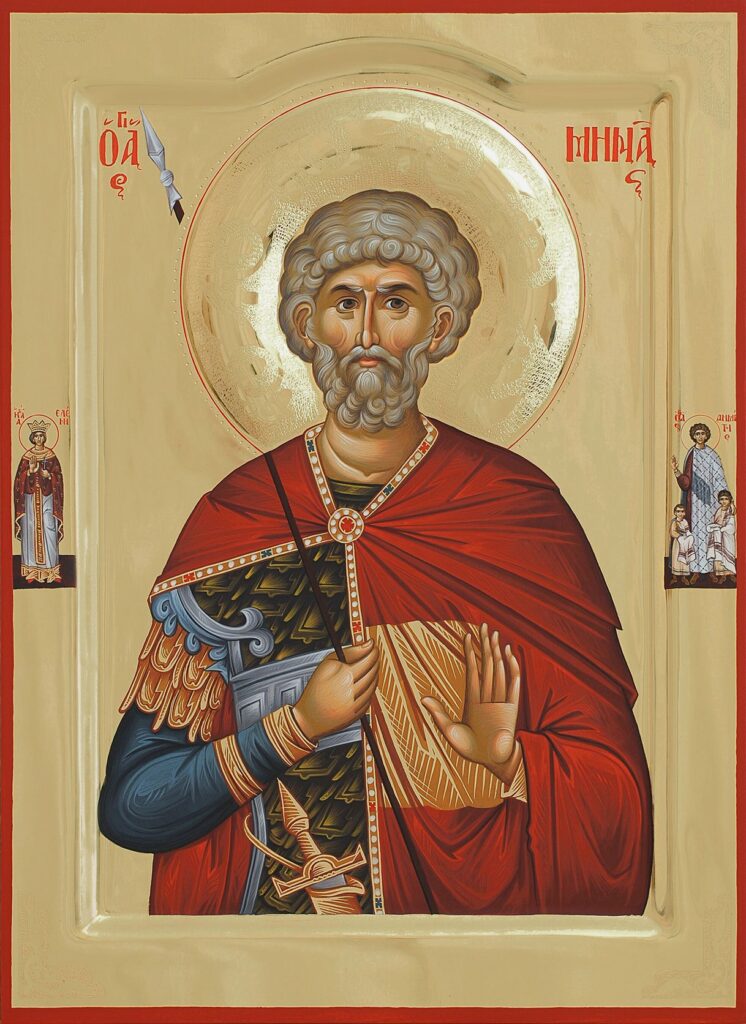Commemorated on November 11

Born in Egypt during the second half of the 3rd century, Saint Menas lived during the reign of the cruel emperors Diocletian and Maximan. He was raised as a pagan, as both his parents worshipped idols, but he saw this life as death. He did not like to see the people around him worshipping the empty stone.
When Menas discovered the Christian faith. He felt like he knew this was the true religion of God and he followed it from an early age of approximately 15. Practicing in secret he had a strong devotion for Jesus Christ.
St. Menas then served as a solider in the Phrygia (modern day Turkey) as a centurion for the Roman army. Although he was a brave and noble soldier, he kept his faith above all else. Very quickly he was appointed as a high officer, and the other soldiers had great respect for him due to his integrity. When Diocletian began persecuting Christians, Maximian made known that he would not serve under the emperor is he was to persecute Christians. This persecution would last from 305 – 311 AD.
Menas boldly went before the Commander and threw off his soldier’s garments saying he would not fight against the Christians
He then left to a mountain where he learned the ascetic life around the age of 20. He flourished with prayer and fasting, growing closer to the Lord. From his true devotion to Christ he grew very quickly in spirit. He remained in the mountain many years and he kept prayer always with him. and came down from the mountain around the age of 50. God revealed to him in a vision that he would die a martyr and he knew it was his time to begin and share the word of God among the people.
He told the people that the idols were empty and it is only through Christ there is life. He shared with them his story and showed to them the grace God had upon his life.
One day he entered the city during a large pagan celebration. Menas was so greatly disturbed by the events and celebration of the false gods that during one of the most exciting event of the festival, he spoke out against the wicked forces they were worshipping and preached for the one true God.

He was then taken by pagan officials and scheduled for a trial. The official told him that he was in a dire situation. Not only had he left army, he had also spoken poorly for the pagan gods and professed his devotion to Christ. When he stood before the judge, he again spoke without fear and proclaimed the true word of Jesus Christ. He also spoke boldly against the government saying that it was unjust in their worship. Pyrrhus the governer of the area did not like Menas’ show of faith and anger brewed within him.
Phrryus however gave Menas a chance to turn back from Christianity, saying that he would give him his title as a prestigious solider if he rebuked Christianity and worshipped the idols.
Menas did not give in and again proclaimed his loyalty to Christ. He was then subjected to terrible torments. They whipped for such a long period that three different men rotated the job as their arms grew tired from whipping him. This caused so great damage you could see his bones between his flesh. They then took a blanket of very rough wool and rubbed it against his aching flesh. They dragged him against the ground, dragging his flesh against the stones and in the end they pulled his body over nails and his body was torn to many pieces. During this tough times he remained alive, and said to himself, “They can destroy your body, but they cannot take your soul!” The soldiers who had been his friends had compassion for him saying “Do not fear, God will have mercy on you if you deny Him because you have this hard situation given to you.”
But he responded firmly saying “I do not fear, for Christ is with me and he gives me the strength to carry on.”
The commander overheard Saint Menas and was amazed at his wisdom and his strength during so heavy torments. He asked him how he was able to speak with so great depth.
Saint Menas said “From the word of God we know, as Christ spoke to us, ‘When they catch you for my name, do not have stress. The holy spirit will come to you and speak for you.’ ”
At this time the commander did could see that Menas was not going to deny Christ and then ordered that he was beheaded. Before dying, he spoke to the friends he had asking that they bury him in Egypt. He was then beheaded and he sacrificed his life unto God in November 11, around the year 304 AD. With joy Saint Menas flew to the heavens.
The faithful Christians he knew gathered his relics, and knowing of his holiness, kept them hidden until the end of this era of persecution.
When Christianity was freely practiced under the rule of Constantine the Great, the Christians who had kept his holy relics took them and sought a location to place them. While traveling they came to a city near Alexandria where the camel would not go further. No matter how they tired, the camel would not move and they saw this as sign from God this was where the relics were to be. They buried his relics in this exact spot. Many Christians came to venerate his holy relics. They remained there until Patriarch Athanasius built a large church over the burial spot of the relics in honor of Saint Menas. With time, the church grew into two large monasteries, with a second church as well as a guest space for pilgrims and a hospital.
Saint Menas’ holy relics worked many miracles and have cured those from demonic possession as well as severe sicknesses. He is also known to protect those in need during a battle or war.
It is also to Saint Menas we pray whenever we cannot find something.
Thank you Saint Menas!

Troparion & Kontakion
Troparion — Tone 4
Your holy martyrs, O Lord, / through their sufferings have received incorruptible crowns from You, our God. / For having Your strength, they laid low their adversaries, / and shattered the powerless boldness of demons. / Through their intercessions, save our souls!
Kontakion — Tone 8
Today the church honors those who fought the good fight and died for their faith: / The victorious Menas, the noble Victor and the ascetic Vincent. / The church glorifies their divine struggle and cries out with love: / Glory to You, O Christ, the lover of mankind.